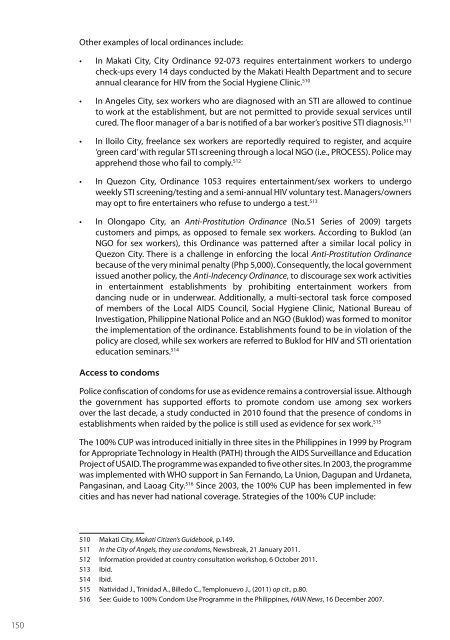SEX WORK AND THE LAW - HIV/AIDS Data Hub
SEX WORK AND THE LAW - HIV/AIDS Data Hub
SEX WORK AND THE LAW - HIV/AIDS Data Hub
Create successful ePaper yourself
Turn your PDF publications into a flip-book with our unique Google optimized e-Paper software.
Other examples of local ordinances include:<br />
<br />
<br />
<br />
<br />
<br />
In Makati City, City Ordinance 92-073 requires entertainment workers to undergo<br />
check-ups every 14 days conducted by the Makati Health Department and to secure<br />
annual clearance for <strong>HIV</strong> from the Social Hygiene Clinic. 510<br />
In Angeles City, sex workers who are diagnosed with an STI are allowed to continue<br />
to work at the establishment, but are not permitted to provide sexual services until<br />
cured. The floor manager of a bar is notified of a bar worker’s positive STI diagnosis. 511<br />
In Iloilo City, freelance sex workers are reportedly required to register, and acquire<br />
‘green card’ with regular STI screening through a local NGO (i.e., PROCESS). Police may<br />
apprehend those who fail to comply. 512<br />
In Quezon City, Ordinance 1053 requires entertainment/sex workers to undergo<br />
weekly STI screening/testing and a semi-annual <strong>HIV</strong> voluntary test. Managers/owners<br />
may opt to fire entertainers who refuse to undergo a test. 513<br />
In Olongapo City, an Anti-Prostitution Ordinance (No.51 Series of 2009) targets<br />
customers and pimps, as opposed to female sex workers. According to Buklod (an<br />
NGO for sex workers), this Ordinance was patterned after a similar local policy in<br />
Quezon City. There is a challenge in enforcing the local Anti-Prostitution Ordinance<br />
because of the very minimal penalty (Php 5,000). Consequently, the local government<br />
issued another policy, the Anti-Indecency Ordinance, to discourage sex work activities<br />
in entertainment establishments by prohibiting entertainment workers from<br />
dancing nude or in underwear. Additionally, a multi-sectoral task force composed<br />
of members of the Local <strong>AIDS</strong> Council, Social Hygiene Clinic, National Bureau of<br />
Investigation, Philippine National Police and an NGO (Buklod) was formed to monitor<br />
the implementation of the ordinance. Establishments found to be in violation of the<br />
policy are closed, while sex workers are referred to Buklod for <strong>HIV</strong> and STI orientation<br />
education seminars. 514<br />
Access to condoms<br />
Police confiscation of condoms for use as evidence remains a controversial issue. Although<br />
the government has supported efforts to promote condom use among sex workers<br />
over the last decade, a study conducted in 2010 found that the presence of condoms in<br />
establishments when raided by the police is still used as evidence for sex work. 515<br />
The 100% CUP was introduced initially in three sites in the Philippines in 1999 by Program<br />
for Appropriate Technology in Health (PATH) through the <strong>AIDS</strong> Surveillance and Education<br />
Project of USAID. The programme was expanded to five other sites. In 2003, the programme<br />
was implemented with WHO support in San Fernando, La Union, Dagupan and Urdaneta,<br />
Pangasinan, and Laoag City. 516 Since 2003, the 100% CUP has been implemented in few<br />
cities and has never had national coverage. Strategies of the 100% CUP include:<br />
510 Makati City, Makati Citizen’s Guidebook, p.149.<br />
511 In the City of Angels, they use condoms, Newsbreak, 21 January 2011.<br />
512 Information provided at country consultation workshop, 6 October 2011.<br />
513 Ibid.<br />
514 Ibid.<br />
515 Natividad J., Trinidad A., Billedo C., Templonuevo J., (2011) op cit., p.80.<br />
516 See: Guide to 100% Condom Use Programme in the Philippines, HAIN News, 16 December 2007.<br />
150
















